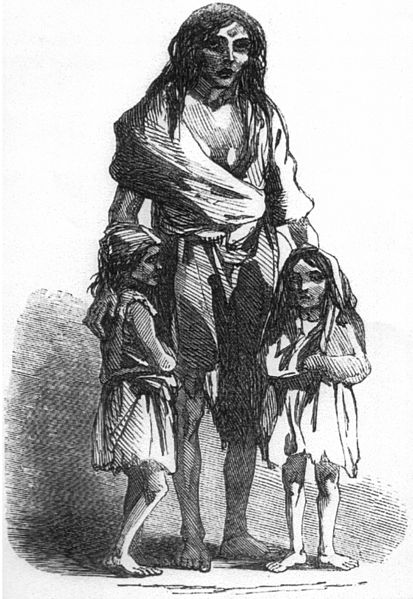As many of you know, I am not just a father, husband, professor, columnist, and blogger – I’m also a musician. I play in two Irish pub bands: The Tooles and Mulligan Stew. As a result, the last few days have been busy, with more shows to come.
Last summer, I played the Iowa Irish Festival in the town of Waterloo. There, I met Derek Warfield, a famous Irish musician, and a partisan for the Republican movement (about which there was some controversy, some decades ago). He and his band, the Wolfe Tones, wrote some of the great Irish rebel songs. Those that they didn’t write, they certainly sang and with gusto. But in the last decades, Derek has spent as much time working as a historian. At the festival, I heard Warfield give a talk on the great famine in 19th-century Ireland, the famine that drove so many Irish to come to America. His thesis: The famine was an act of genocide by the English against the Irish.
The standard definition of genocide, a definition that emerged out of WW2, remains, “Genocide is the systematic killing of all or part of a racial, ethnic, religious or national group.” While intention doesn’t matter in terms of the crime, I’m also interested in why the systematic killing takes place. Does it happen because of perceived identity differences?
Warfield’s basic argument is this:
1) The Irish were starving. They were starving because of a shift to monoculture (potatoes) that left them susceptible to blight. This was, at least in part, the fault of English landlords.
2) The English in power knew their Irish subjects were starving. [This is debated]
3) The English had plenty of extra food in storage, including in the major estates in Ireland. [This is debated too]
4) The English debated sending food relief to Ireland, and explicitly discussed the risk of wide-spread suffering and death due to inaction.
5) They chose not to help for both philosophical and racist reasons. [Hey, this is also debated]
Hence, the Irish who died or had to leave (ethnic cleansing) did so because of English inaction.
There does seem to me to be a categorical difference between marching groups to a field, having them dig graves, then shooting them as opposed to letting a “natural” event take its course without interceding. If this is genocide, it is a passive genocide, but that statement isn’t intended to let the specific 19th-century English bastards who allowed the Irish to starve off the hook. They definitely made their choices and the repercussions of those choices have resonated across American and British history ever since.
I’m writing this up, in part, as a reaction to Timothy Egan’s op-ed in yesterday’s New York Times. He wrote a scathing response to Paul Ryan’s exhortations about poverty by linking Ryan’s speech to the speech of those very English bastards who decided to let Ryan’s ancestors starve.
Paul Ryan, after relating an invented story about a poor child who didn’t want a free lunch, said:
On Wednesday, he went further, using the language of racial coding. This, after he told a story of a boy who didn’t want his free school lunch because it left him with “a full stomach and an empty soul.” The story was garbage — almost completely untrue.
We have this tailspin of culture, in our inner cities in particular, of men not working and just generations of men not even thinking about working or learning the value and the culture of work.” [Egan] In other words, these people are bred poor and lazy.
“We have this tailspin of culture, in our inner cities in particular, of men not working and just generations of men not even thinking about working or learning the value and the culture of work.” In other words, these people are bred poor and lazy.
Where have I heard that before? Ah, yes — 19th-century England. The Irish national character, Trevelyan confided to a fellow aristocrat, was “defective.” The hungry millions were “a selfish, perverse, and turbulent” people, said the man in charge of relieving their plight.
This is not the most damning quote from Trevelyan, who also said, “The judgement of God sent the calamity to teach the Irish a lesson, that calamity must not be too much mitigated. …The real evil with which we have to contend is not the physical evil of the Famine, but the moral evil of the selfish, perverse and turbulent character of the people.” Trevelyan was concerned that if the government gave relief, people would be come dependent on that relief, and develop the habit of not working.
Interestingly, and not in Egan’s piece, when Ryan was confronted over the racism implicit in his comments, he responded that rural areas also have poverty because of a lack of jobs. Note: Urban – no culture of working; Rural – no jobs.

Richard Rubenstein makes a very compelling argument concerning the Irish famine being genocide in chapter six of his book "The Age of Triage."
Thanks! I'll look for it.